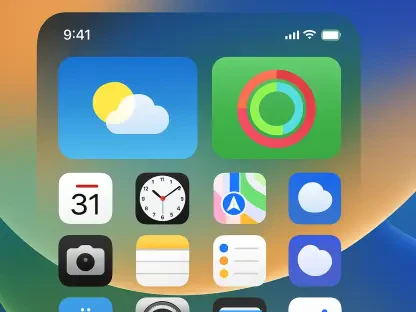As mobile technology continues to evolve, the banking industry is experiencing a significant transformation characterized by the emergence and widespread adoption of mobile banking. Smartphones have become integral to many people’s daily lives, offering features that make traditional, in-person banking feel increasingly obsolete. With the ability to manage finances on-the-go, mobile banking services are quickly becoming the standard for modern financial transactions. The rise of mobile-only solutions shows how banking options once seen as supplementary are now essential.
Evolution of Banking Practices
From Branch Visits to Phone Screens
The financial world is witnessing a profound shift as traditional in-person banking becomes less common due to the conveniences afforded by mobile banking. Consumers are no longer bound by the constraints of visiting physical branches or enduring long wait times to manage their finances. Instead, mobile platforms offer an experience that is both fast and efficient. The concept of “click-and-go” has replaced the time-consuming method of completing physical paperwork. Customers now regulate their bank accounts, transfer funds, and even invest in digital currencies all through user-friendly applications available on their smartphones.
As mobile banking continues to rise in popularity, data reveals a clear preference for these digital services. The American Bankers Association’s recent survey indicates that a substantial 71% of consumers prefer managing their finances through mobile apps or online platforms. This trend illustrates a broader industry trend where having an advanced digital banking infrastructure is not just a competitive advantage but a necessity for banks aiming to attract and retain customers.
The Decline of Traditional Financial Methods
Traditional banking institutions now face a major challenge as their brick-and-mortar locations see decreased traffic. This trend signifies a broader cultural shift where consumers gravitate towards digital interfaces that promise immediacy and convenience. The operational limitations of physical branches are stark, requiring human interaction, which can be frustratingly slow and inefficient. In contrast, mobile applications offer immediate services, all through the press of a few buttons on a smartphone. This shift in consumer behavior underlines the critical role mobile banking plays today.
What was once an industry driven by the need for face-to-face interactions has now been revolutionized by the advent of mobile technology. The banking industry is not just digitally transforming, but adapting to an entirely new ecosystem where services are instant, personalized, and universally accessible. As a consequence, financial institutions are faced with the imperative to innovate and remain relevant in this rapidly changing landscape. This shift illustrates a fundamental change, where mobile solutions are no longer considered an extension of traditional banking, but rather its rightful successor.
Mobile Banking Advantages
Speed, Simplicity, and Security
One notable benefit of mobile banking is the unmatched speed and simplicity it offers, transforming the way consumers experience financial services. Onboarding has become a seamless process, often requiring nothing more than an ID and a few taps on the mobile app. Traditional barriers such as minimum balances, lengthy verification procedures, and the necessity of a local address have vanished. This streamlined process allows even those in underserved regions, such as Sub-Saharan Africa and Southeast Asia, to access banking services easily, catapulting mobile platforms to the forefront of financial inclusion efforts.
Security, once a significant concern for digital financial transactions, has been enhanced tremendously with advancements in technology. Mobile banking apps now integrate biometric features including fingerprint and facial recognition to ensure secure logins and prevent unauthorized access. Real-time notifications for every transaction add another layer of security, providing users with immediate awareness and control over their financial activities. These features collectively reflect a commitment to safeguarding users’ financial data and building trust in the evolving digital marketplace.
Cryptocurrency and Cross-Border Transactions
As the world becomes more globalized, consumers seek integrated financial solutions that facilitate international transactions with ease. Mobile banking platforms have not just met but exceeded expectations by regularly updating features that cater to a global audience. The inclusion of multi-currency functionalities allows customers to easily manage diverse portfolios, make cross-border transactions, and access cryptocurrencies. As global trade intensifies, the need for swift and cost-effective transfers becomes paramount, and mobile banking platforms are adeptly meeting this demand.
Cryptocurrency integration has further propelled mobile banking into the future, aligning financial systems with the evolving digital currency landscape. Platforms like Black Banx permit transactions in well-known cryptocurrencies like Bitcoin and Ethereum, offering reduced transactional fees, faster processing times, and enhanced accessibility. These innovations signify a transition not only in consumer habits but also in entrepreneurial ventures, with mobile banking leading the charge as financial services become undeniably borderless.
Financial Inclusion and Access
Bridging the Gap for the Unbanked
A compelling advantage of mobile banking is its ability to promote financial inclusion. Despite global advances in financial services, approximately 1.4 billion people worldwide remain unbanked, according to World Bank data. Mobile banking stands as a crucial tool in bridging this gap, enabling financial access to individuals who lack traditional banking resources. By leveraging mobile technology, platforms facilitate economic participation for those previously sidelined from the formal economy, empowering individuals and driving localized economic development.
The mobile-only approach has also provided new opportunities for demographic groups that previously struggled to access conventional banking services. Migrants, single parents, and digital nomads can now efficiently manage their finances, no matter the geographic location or time zone, using multi-currency accounts and digital wallets. As mobile platforms democratize access to financial services, they empower individuals who are part of the gig economy, encouraging participation in a more flexible, decentralized financial ecosystem.
Transformative Narratives and Real-World Impact
The tangible impacts of mobile banking extend far beyond sheer numbers, manifesting in real-world stories that demonstrate its transformative potential. For migrants navigating financial responsibilities across countries, mobile banking offers a secure channel for transferring money home without the high costs associated with traditional financial intermediaries. Single parents juggling work and child-rearing can conveniently process payments globally, while digital nomads enjoy the flexibility of accessing multi-currency funds from anywhere in the world.
Through these narratives, it becomes evident that mobile banking operates not just as a service but as a liberating force, redefining what is possible in the realm of financial transactions. Its ability to facilitate instant transactions, coupled with decreasing operational costs, positions mobile platforms as central players in shaping the future financial landscape. The ongoing enhancements within these platforms continually enrich users’ experiences, cementing mobile banking’s status as an indispensable tool.
Future Prospects in Mobile Banking
Innovation and Expansion
Looking ahead, the pace of innovation in mobile banking shows no signs of slowing down. The pursuit of innovation remains at the forefront, with companies like Black Banx committed to expanding their presence further and enhancing their offerings. Prospective developments include features that integrate tools within the decentralized finance (DeFi) realm—a move that signifies deeper engagement with emerging financial trends. Customizable financial advice delivered through mobile applications also points to future personalized experiences where users can manage finances with more insight.
Artificial intelligence continues to serve as a linchpin for these advancements, delivering innovations such as real-time fraud detection. AI’s role in driverless banking experiences encompasses sophisticated automation that not only trims costs but also intensifies customer engagement. With operational adaptability as a distinct advantage, mobile-first banks are well-positioned to tap into new market segments and respond swiftly to evolving demands, further entrenching their position as essential financial resources.
The Road Ahead
As mobile technology advances, the banking sector is undergoing a profound transformation marked by the rise and broad acceptance of mobile banking. Smartphones have become indispensable in the everyday lives of countless individuals, offering capabilities that render traditional, face-to-face banking increasingly antiquated. The convenience of managing one’s finances anytime and anywhere has made mobile banking services the new norm for contemporary financial dealings. This shift is evidenced by the emergence of mobile-only banking platforms, highlighting how options that were once viewed merely as supplementary have now become vital components of the financial landscape. This evolution underscores the ongoing fusion of technology with banking, providing users with unparalleled flexibility and control over their financial activities. As a result, banking institutions are compelled to innovate, adapting to an era where accessibility and technological integration are key to meeting customer demands and staying competitive in a rapidly changing marketplace.









